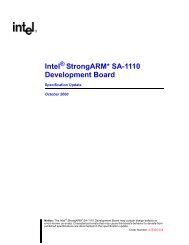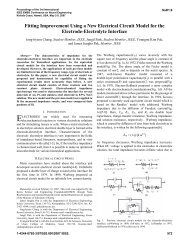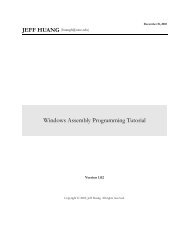Beej's Guide to Network Programming Using Internet Sockets
Beej's Guide to Network Programming Using Internet Sockets
Beej's Guide to Network Programming Using Internet Sockets
- No tags were found...
You also want an ePaper? Increase the reach of your titles
YUMPU automatically turns print PDFs into web optimized ePapers that Google loves.
Beej’s <strong>Guide</strong> <strong>to</strong> <strong>Network</strong> <strong>Programming</strong> <strong>Using</strong> <strong>Internet</strong> <strong>Sockets</strong> 20}if (argc != 2) { // error check the command linefprintf(stderr,"usage: getip address\n");exit(1);}if ((h=gethostbyname(argv[1])) == NULL) {herror("gethostbyname");exit(1);}// get the host infoprintf("Host name : %s\n", h->h_name);printf("IP Address : %s\n", inet_n<strong>to</strong>a(*((struct in_addr *)h->h_addr)));return 0;With gethostbyname(), you can’t use perror() <strong>to</strong> print error message (since errno is notused). Instead, call herror().It’s pretty straightforward. You simply pass the string that contains the machine name (“whitehouse.gov”)<strong>to</strong> gethostbyname(), and then grab the information out of the returned structhostent.The only possible weirdness might be in the printing of the IP address, above. h->h_addris a char*, but inet_n<strong>to</strong>a() wants a struct in_addr passed <strong>to</strong> it. So I cast h->h_addr <strong>to</strong> astruct in_addr*, then dereference it <strong>to</strong> get at the data.












